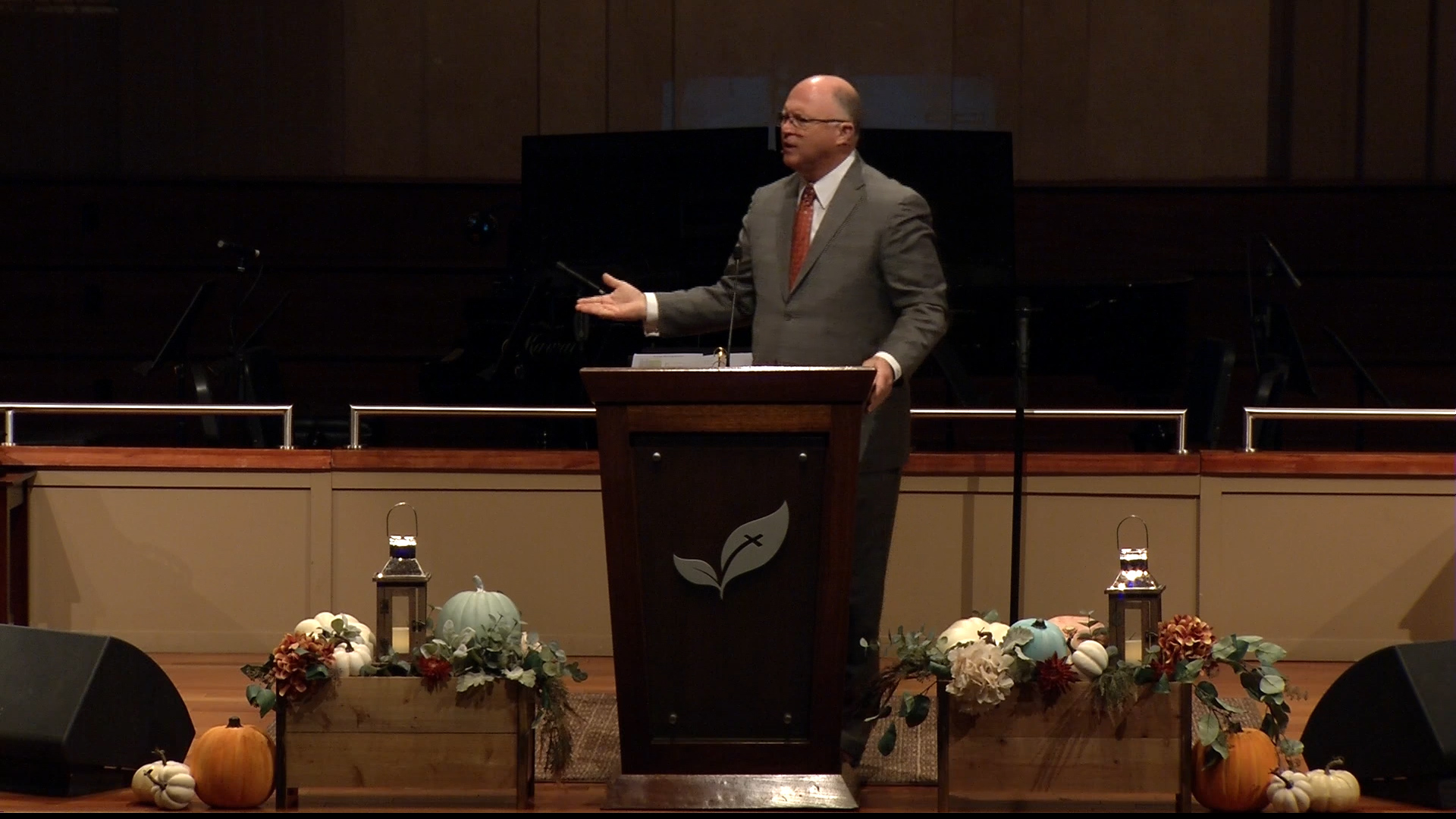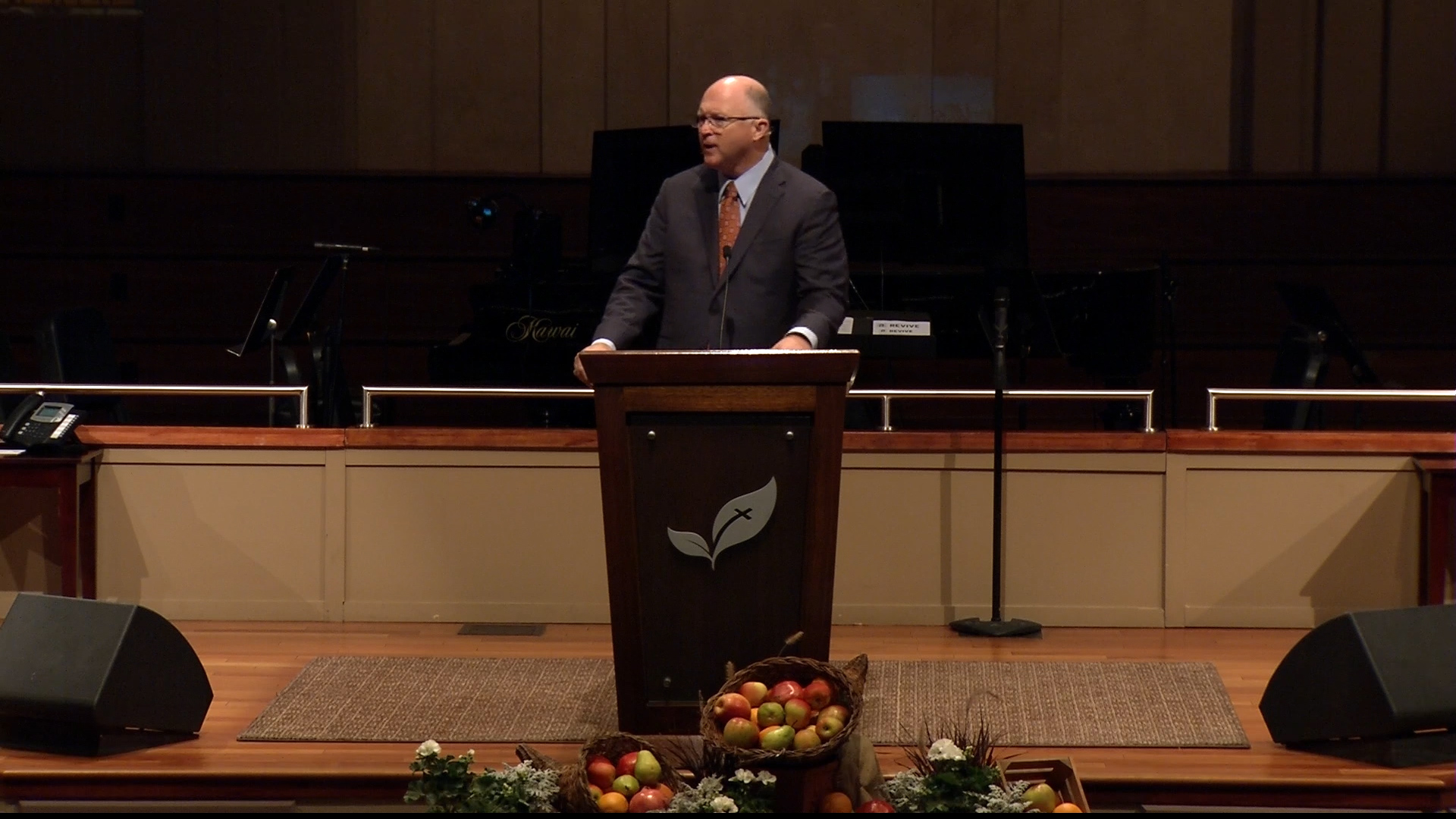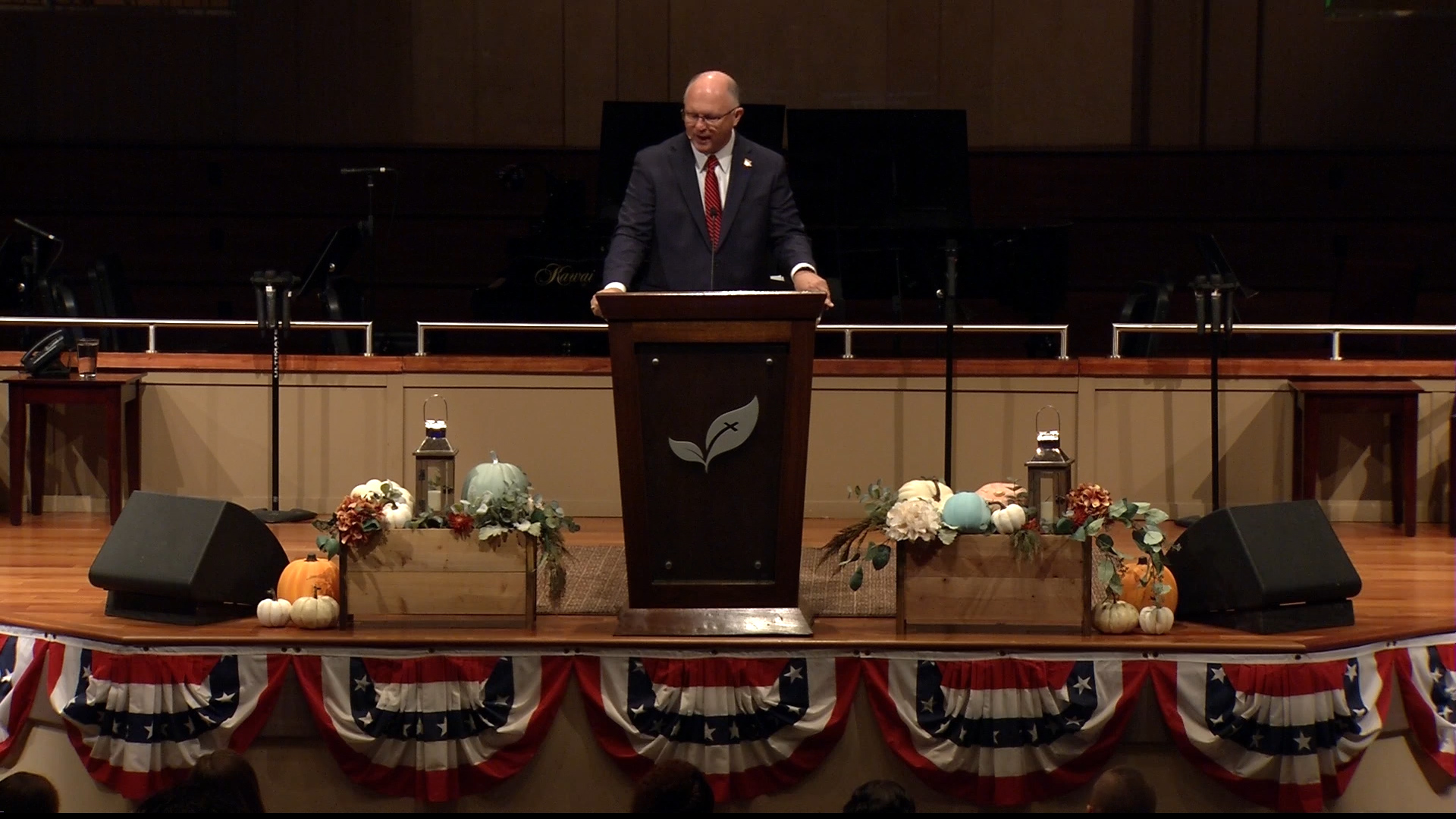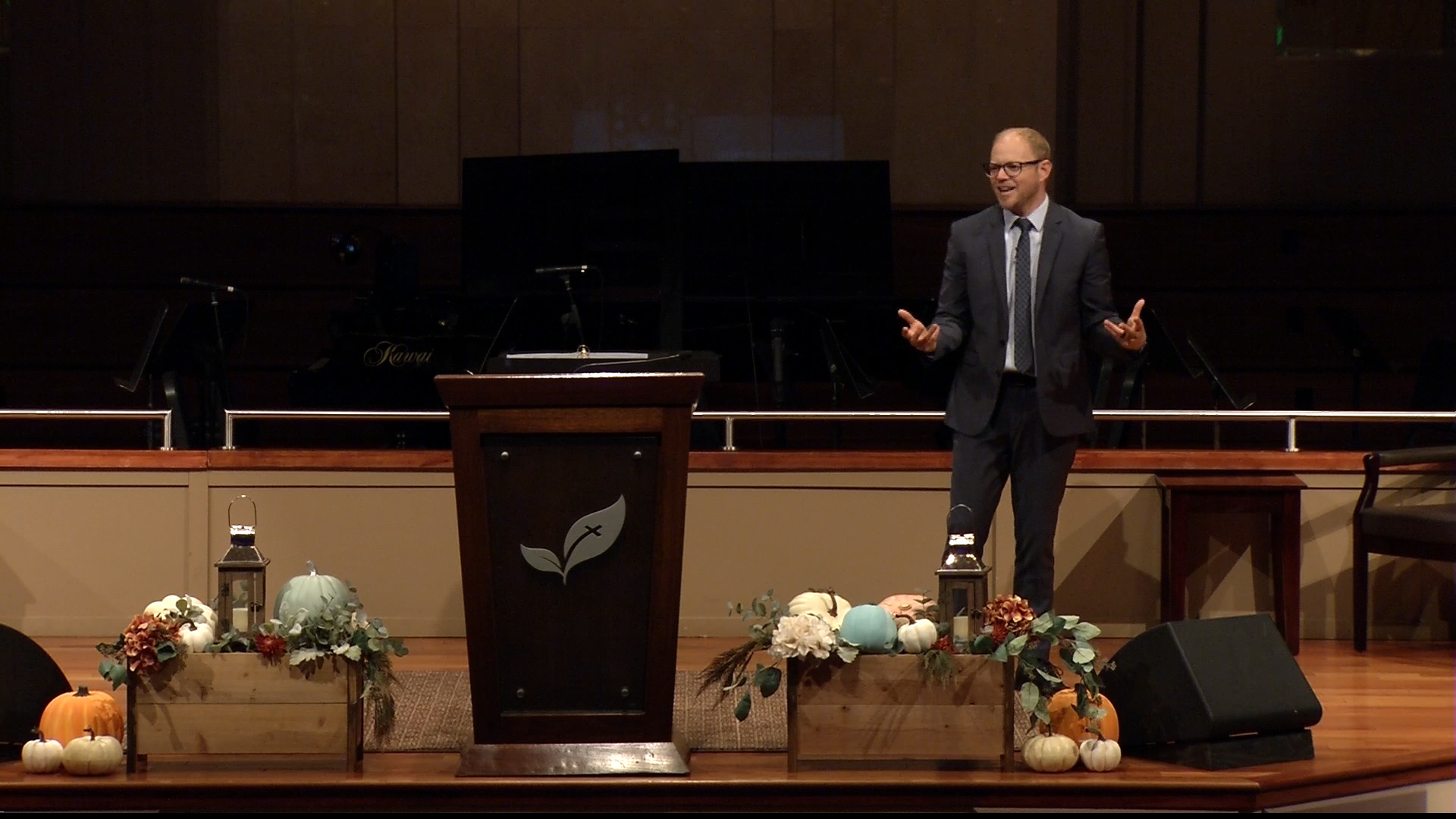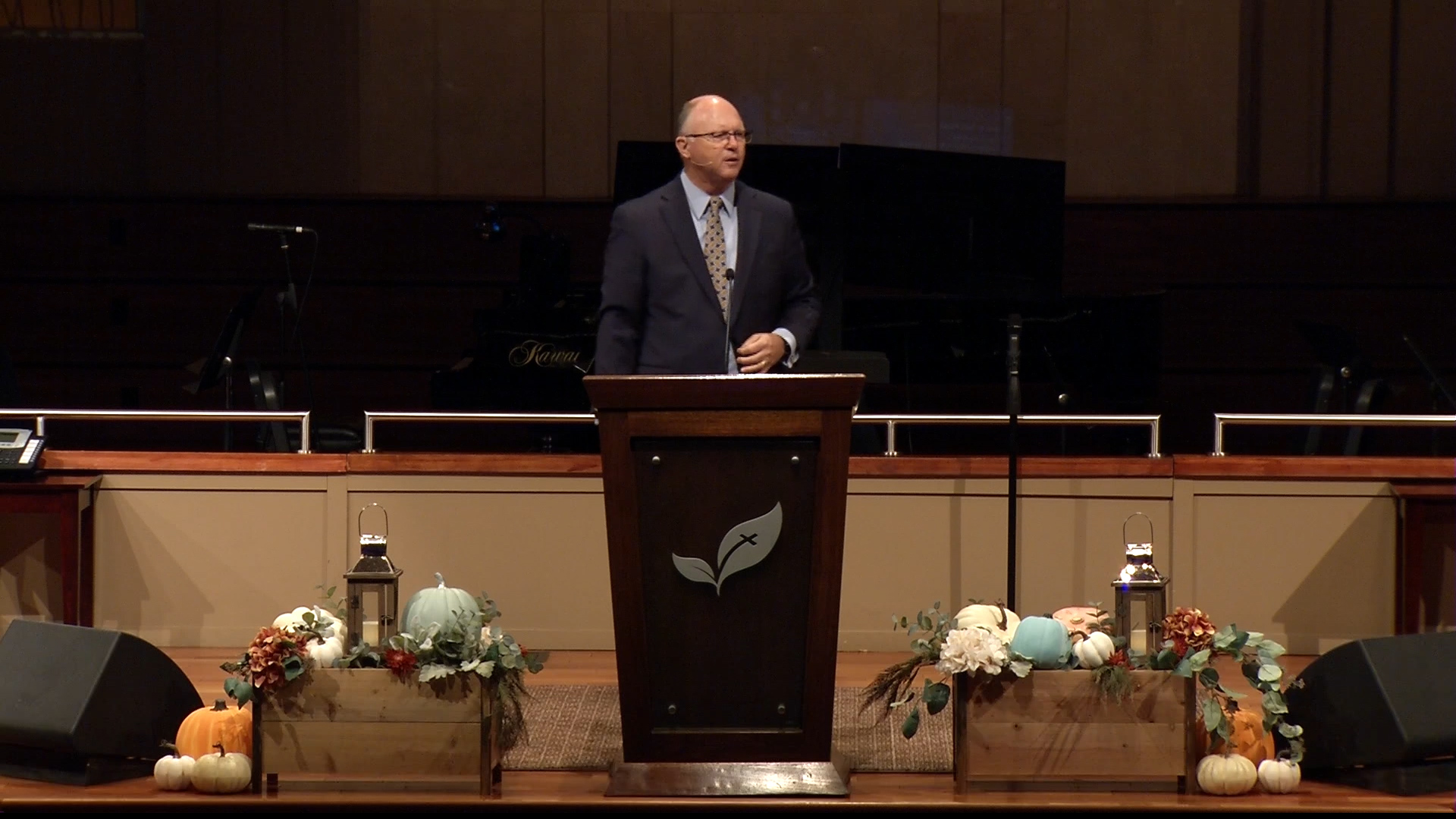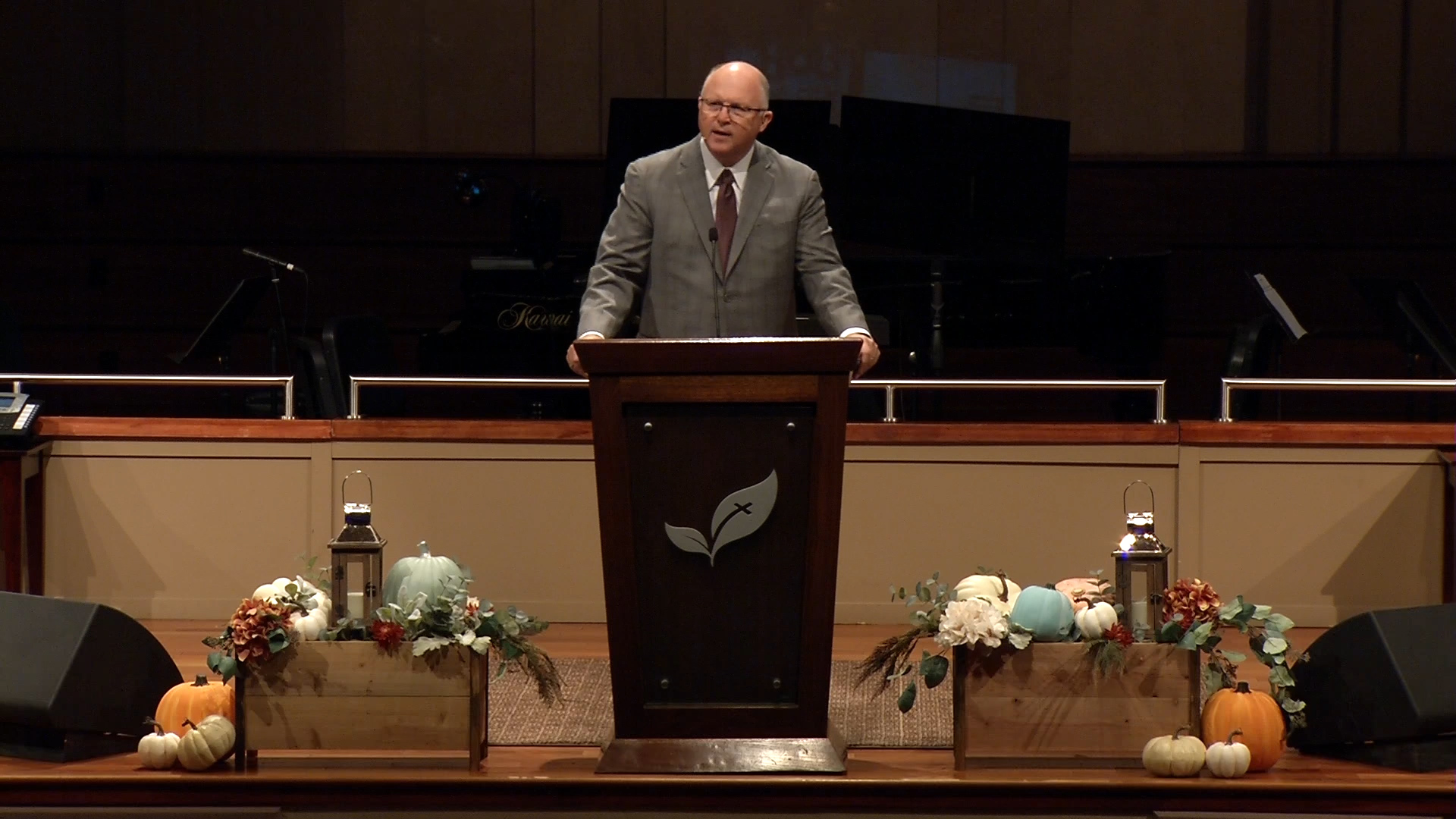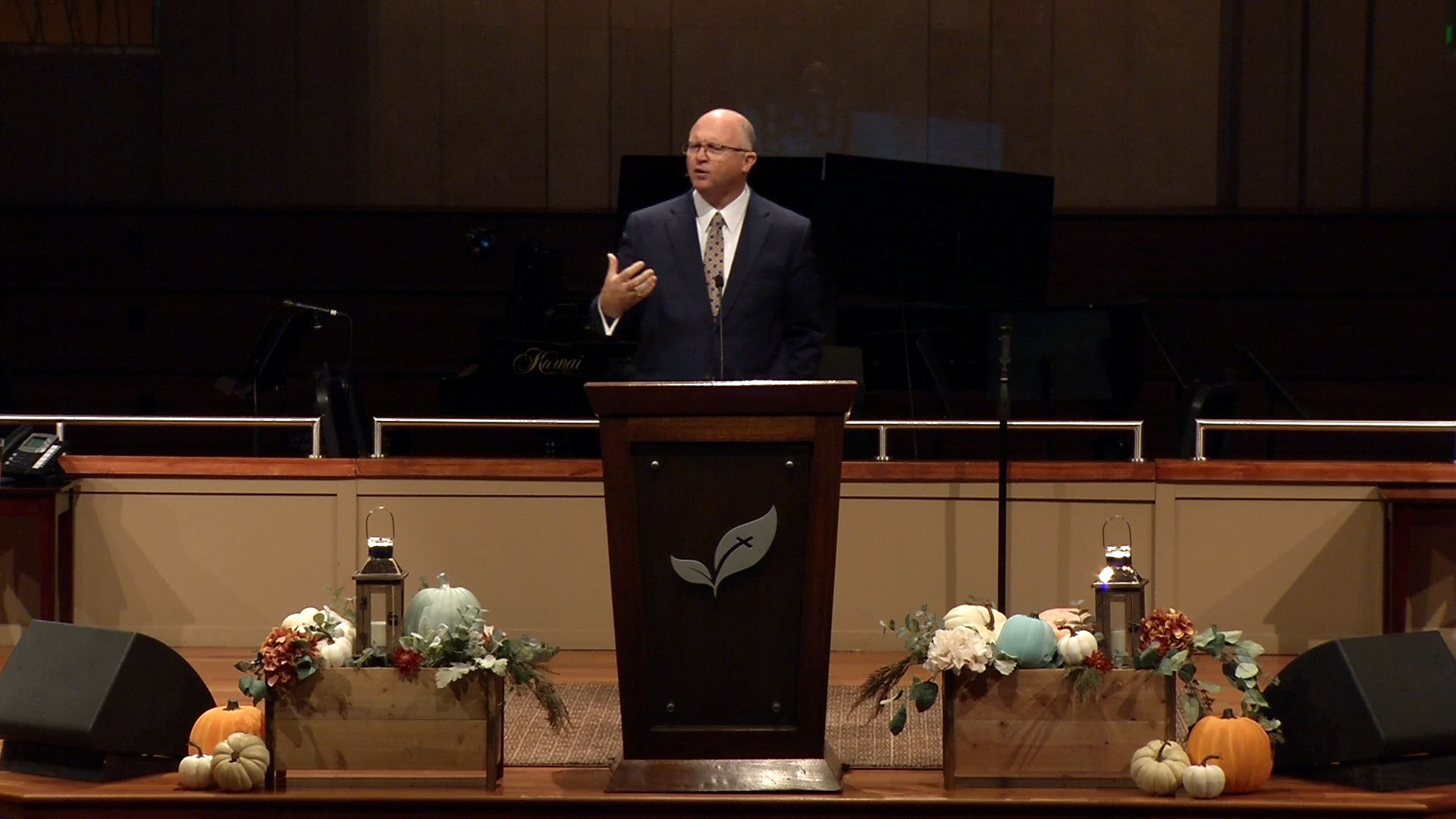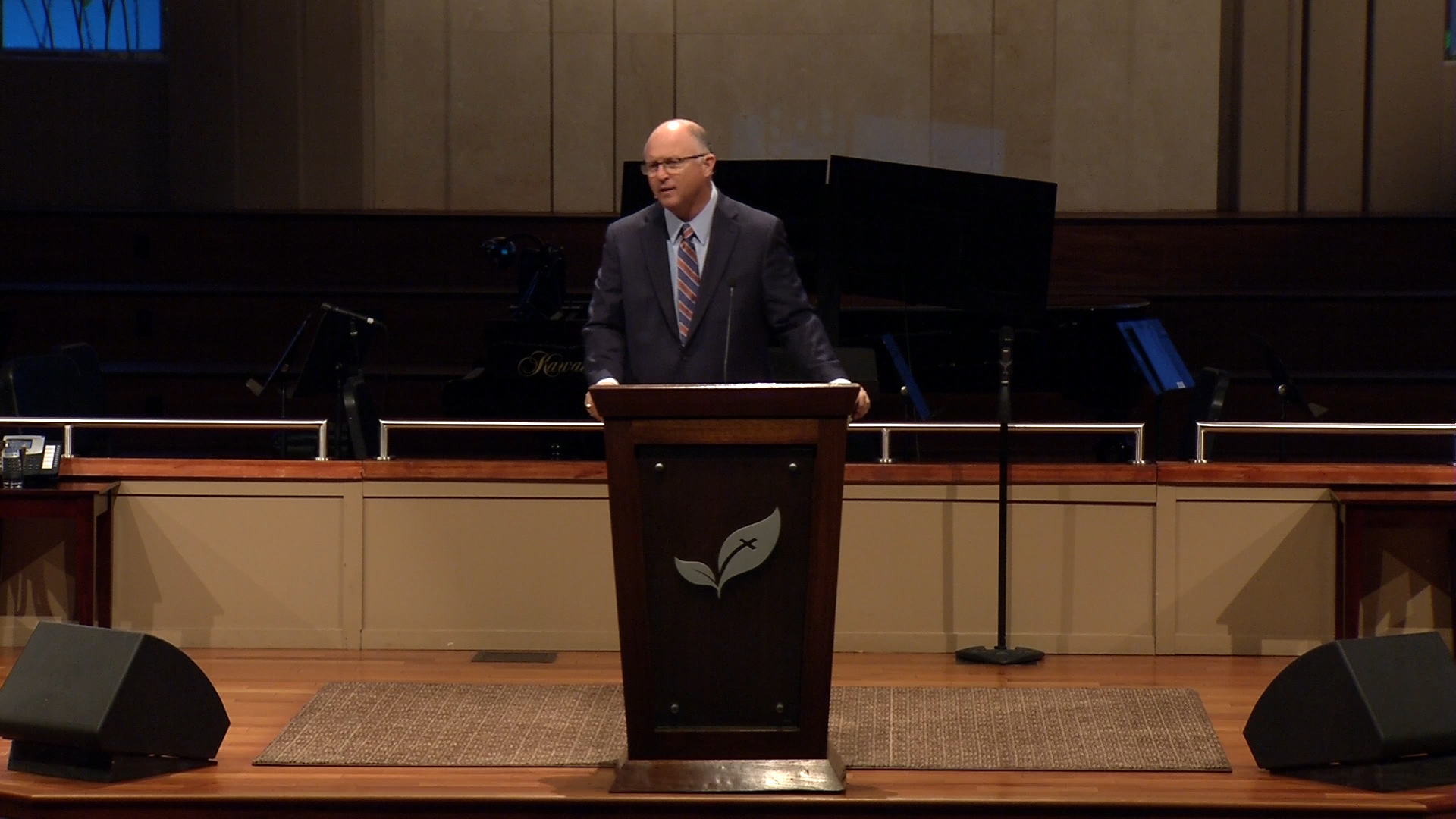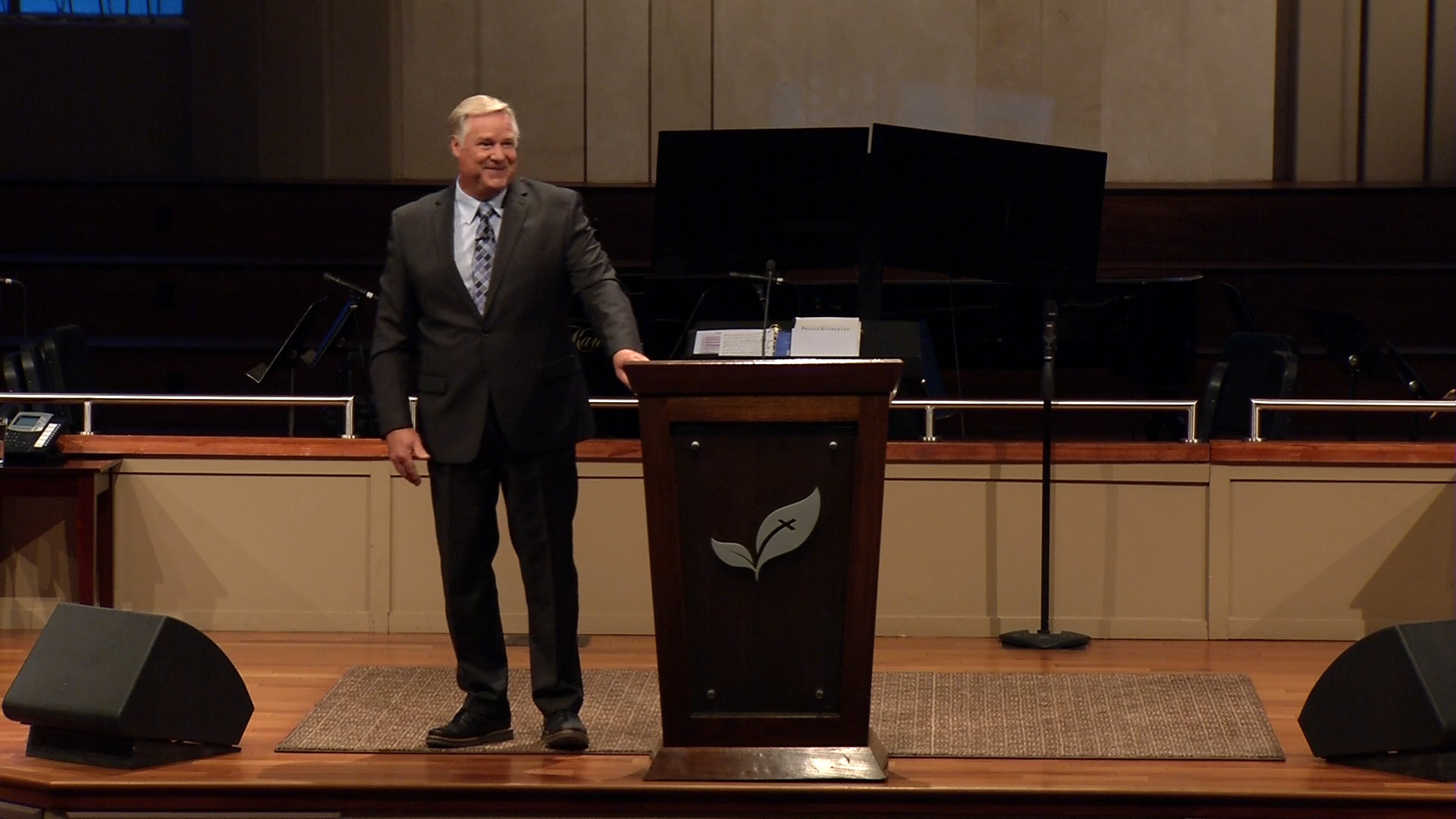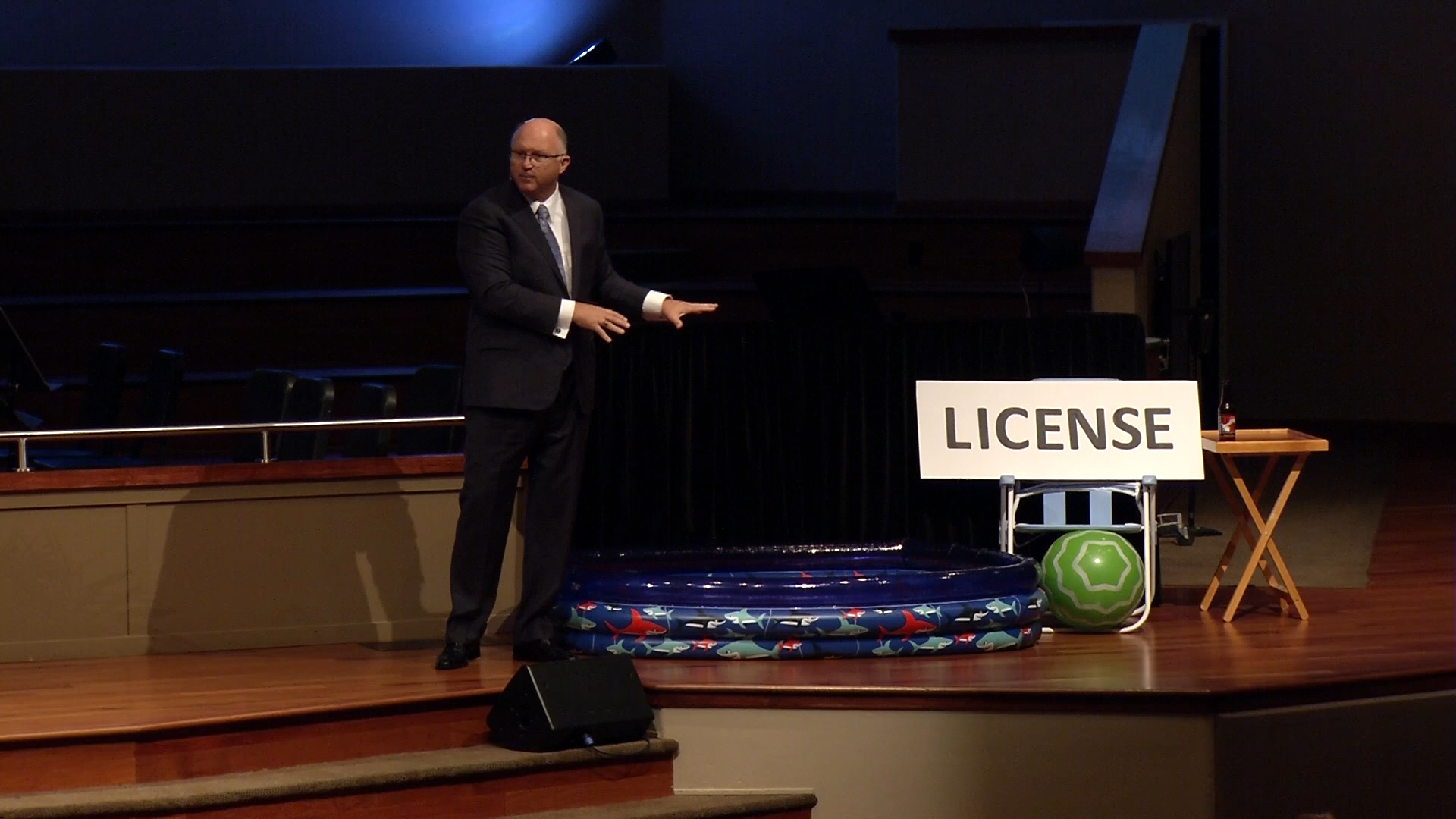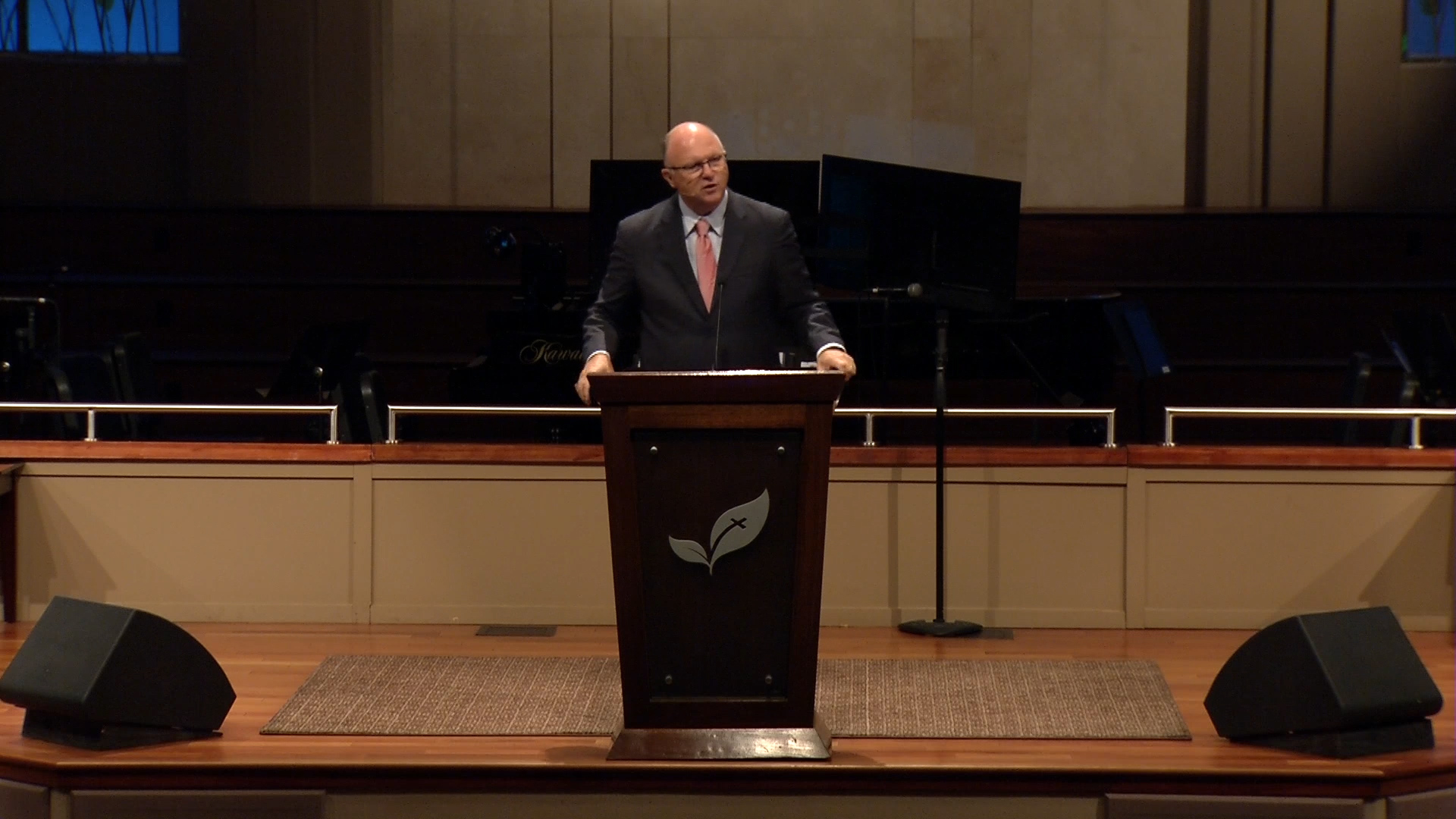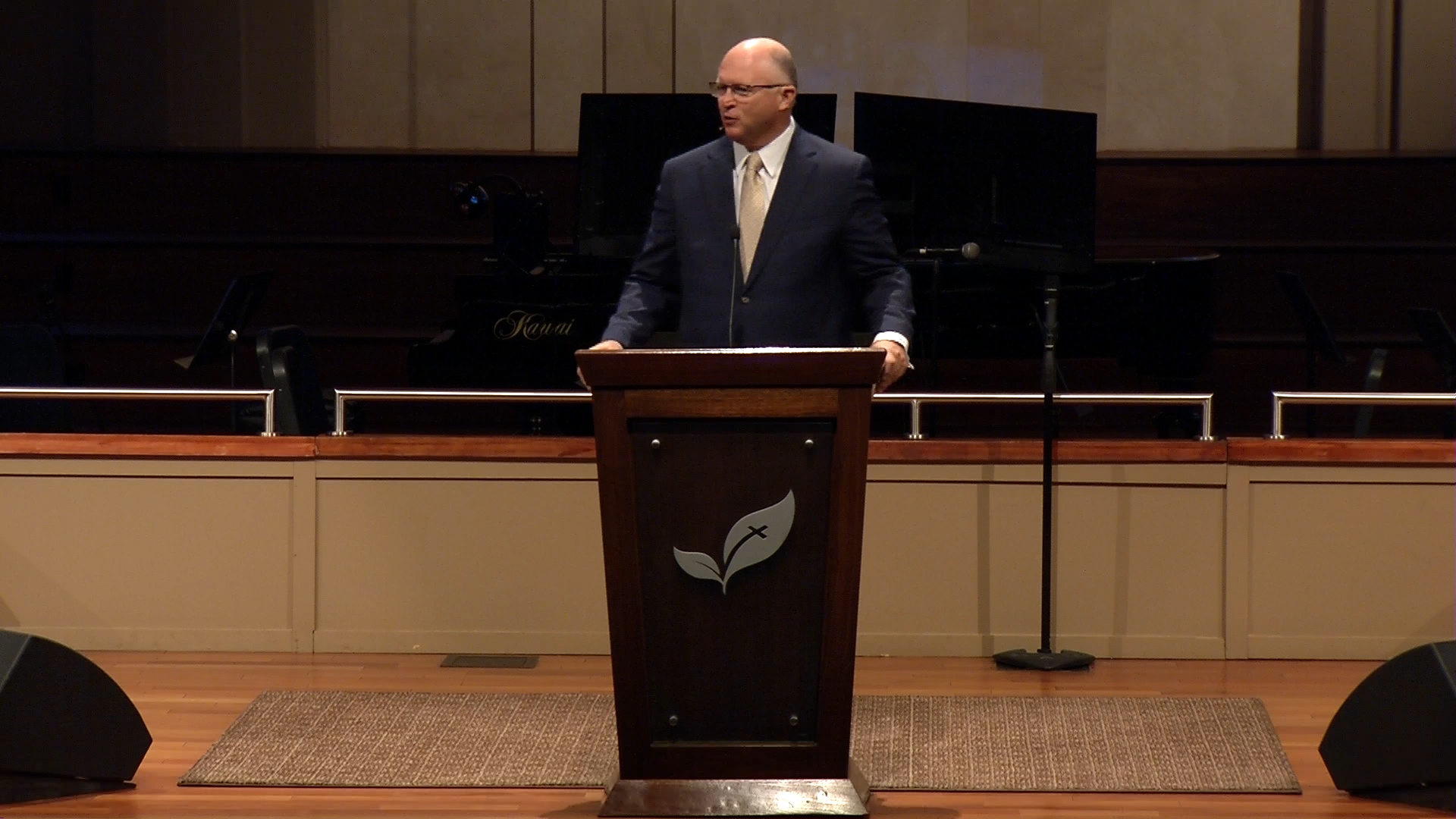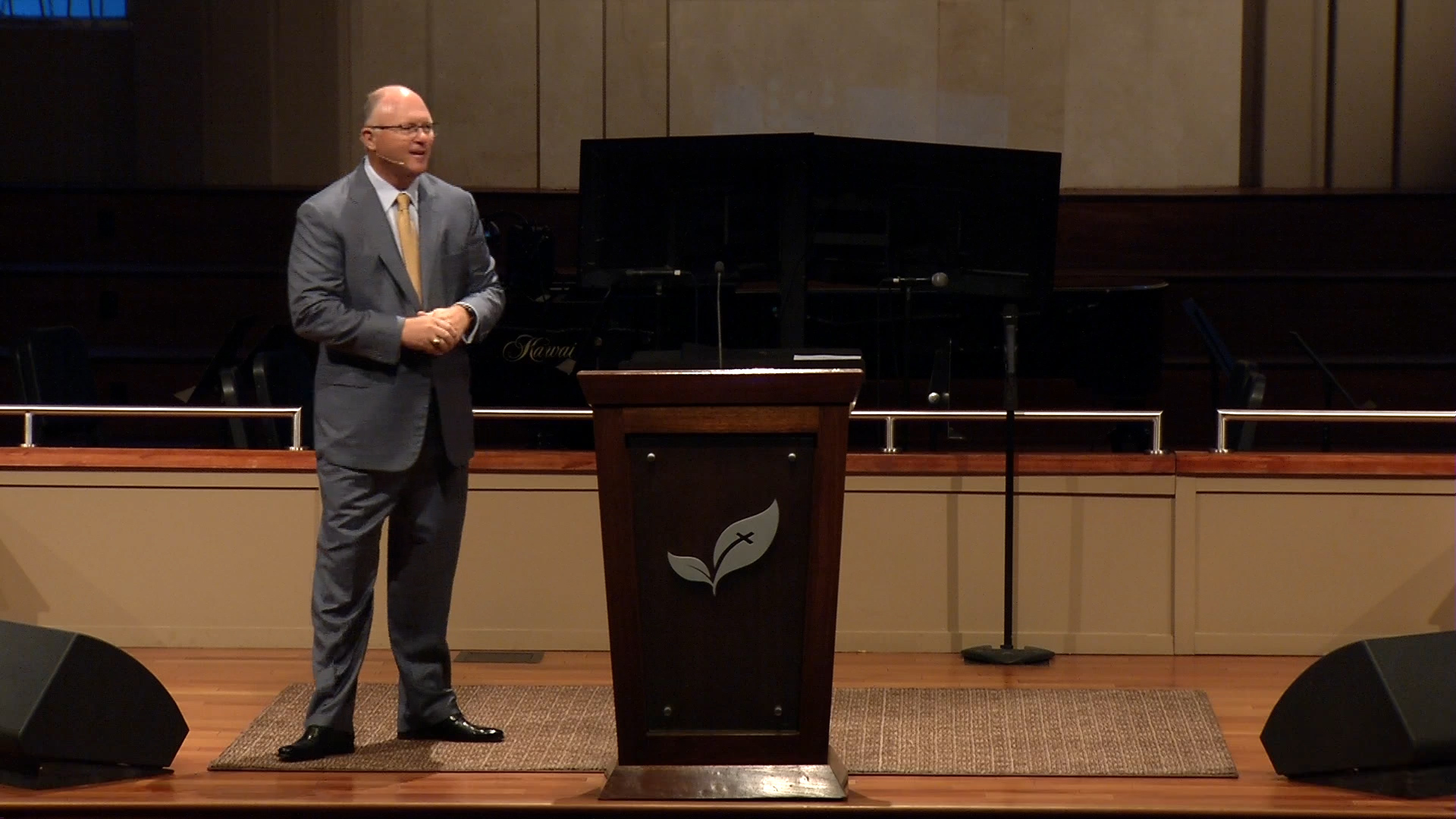Take your Bibles and turn to the book of Colossians this morning, Colossians chapter 3, and we're going to continue our series entitled "One Another." How do we rightly relate to God, and how do we rightly relate to one another in our families, our church, in our workplaces as well? Let's stand together.
Take your Bibles out; Colossians chapter 3. We're going to read one verse for the sake of time. In fact, you're going to find by the end of the next half an hour that this verse is packed with truth; and I think it'll be a great blessing to your life, as it has been to mine. Today we're going to preach on "Admonishing One Another." What does that mean? Colossians 3:16.
Is everybody ready this morning? I don't know about that. Is everybody ready this morning? That's a little better. All right, good. I want to make sure you're awake this morning. Some of you need intravenous coffee to be awake, so we'll do the best we can.
Colossians 3:16, let's follow along as I read: "Let the word of Christ dwell in you richly in all wisdom; teaching and admonishing one another in psalms and hymns and spiritual songs, singing with grace in your hearts to the Lord." Let's pray together.
Father, thank you for this wonderful verse and thank you for the privilege of admonishing and being admonished. And now, Lord, teach us this morning how the body works, how the family works. Teach us how we relate and encourage one another; and I pray this in Jesus' name. Amen. You may be seated.
Well, perhaps this week you have admonished someone. Perhaps you have been admonished by someone. And admonishment is a warning: it is to reprove, it is to exhort someone. And I am finding in our society that people don't like admonishment much these days. People just seem to have a spirit that says, "Get your hand off me," or, "Don't you tell me what to do."
It seems it might be a coach just simply putting his hand on the shoulder pad of a guy who thinks he's the whole team. And now we see athletes screaming back at the coach about receiving admonishment. It seems, perhaps, the referee – by the way, the referee on the field or court is the authority on the field or court. But today any high-paid athlete can scream and yell at the referee and half the fans will agree.
For 32 years here at Lancaster Baptist School and West Coast Baptist College I have never one time yelled at a referee. Now in my mind I have many times. But I've never yelled, and the reason is the referee is the authority on the court, and I want our teenagers to see their pastor respecting authority.
That's very foreign to some in this boisterous, ungodly society in which we live. But the fact of the matter is that I even sometimes go to halftime to the basketball games and I tell our athletes, I say, "Look at when the referee calls a foul on you, you raise your hand to acknowledge your sin. You may or may not have felt like the call was good, but he's the authority."
That little lesson that I'm giving you that's kind of going over your head like that, that spirit towards admonishment is not found very much in America today. It seems like everybody wants to yell at the referee. It seems like everybody wants to yell at the coach. It seems like everybody wants to yell even at their parents. And sometimes you'll see a godly usher or even a godly parent put their hand on the shoulder of a teenager just to admonish them maybe to speak more kindly or maybe to slow down and not run in church, and sometimes the attitude of the average American is, "Get your hand off me, I'll do what I want to do." That's the attitude of the average American today.
Reminds me of the story of a young woman, Chantelle Wilson, who was driving recently 92 miles an hour in a 66 mile an hour zone. She was pulled over, she was given a ticket. She got back into her car and immediately sped to 142 miles an hour, after which the police caught her and arrested her and took her to jail where she belonged. It's as if people are saying, "No one's going to tell me what to do."
Well, I want to tell you something: in the Christian life we all need teaching and we all need admonishment, and we need the helps of both. And I'm telling you right now that most of us wouldn't be alive without admonishment, like, "Don't walk out in the middle of the street." You see, teaching is when we say, "Cars are heavy and cars are fast, and cars are red and cars are blue." That's teaching. Admonishing is when we say, "Don't get in the way of a car." And what I want you to learn this morning is that we all need admonishment, and mature believers want admonishment, okay? So let's get the backdrop and then we'll get into the message.
Paul the apostle had never been to Colossae. This is one of the interesting things about Colossians: he had never personally been there. We read in Colossians 2:1 he had never seen them in the face or in the flesh. It is believed, according to chapter 1 and verse 1 that perhaps Timothy had started this church. But now the apostle is writing to the church at Colossae. And here in this particular letter he writes to them from a Roman prison. It is a prison epistle, and he had received word that there had been some problems with the church at Colossae.
There had been some Greek philosophy and some heresy that had crept into the church. And as these false teaching had come into the church Paul is writing to them to correct those particular issues, and then he says to the believers, "Now you need to admonish one another, so that if these attitudes or false teachings start coming back in the church, teach and admonish one another, because the body must be a place where those issues can be dealt with, and where admonishment can be given and received."
And you see the spirit of that even in chapter 3. In chapter 3 and verse 1, he's telling them, "Keep your priorities on the things that are heavenly, not on the sensual issues of Greek mythology." He's telling them in verse 5 to abstain from earthly and sensual lust. He's telling them in verse 10 to put off the old man, and put on the new man. He's telling them in verse 11 to respect one another, that they were not to have prejudice against someone that is Greek or Jew or whatever their background was, Gentile or Jewish; but that the ground is level at the cross. He tells them in verses 13 and 14 to forgive one another, and love one another.
But then we come to this verse before us, verse 16, where he's telling them to admonish one another. He's reminding them that if it's all going to work that they're going to have to keep one another in check, if you will. They're going to have to warn each other from time to time and admonish one another.
So how does that really work? How can we be effective in giving and receiving admonishment? Let me just draw your attention to this verse in verse 16. Notice it says, "Let the word of Christ dwell in you richly with all wisdom." Notice, if you would, first of all, the message of admonition, the message of admonition. Here we see that we must have the word of Christ in us. The message of admonition is a sure word. It is the word of Christ.
Now this phrase, if you're taking notes, "the word of Christ" refers to the revelation that he brought into the world; that is to say the Bible. So when it says, "Let the word of Christ dwell in you richly," Paul is saying to the Colossians, "The basis of your admonishment, the success of your admonishment will be directly related to how the word of God is dwelling in you." So he says, "I want you to make sure that this word is dwelling in you. And the word of Christ is sure, and you can have confidence in it."
The Bible says in John 17:17, as Jesus prayed to the Father, he said, "Father, sanctify them through thy truth: thy word is truth." The word of God is true, it is pure. Every word of God is pure.
Years ago when I was a young pastor just beginning here 32 years ago, I read in the Bible where Jesus said, "Man shall not live by bread alone, but by every word that proceedeth out of the mouth of God." And I began to think about that: every word. I read Proverbs 35, "Every word of God is pure." And I began to pray and study, and I thought, "Lord, if I'm going to preach the Bible, if I'm going to stand up and say, 'The word of God says,' then I want to know where every word can be found." And I truly believe that God has preserved his word for us in the King James Version of the Bible, and I'm thankful for a trustworthy translation that comes from a great text, not influenced by Catholic doctrine and so forth. And I'm simply saying to you this morning, that when we open this Bible, it's a sure word, it is a trustworthy word.
But not only that, this word is not only sure, but this word must be settled in our hearts. Now notice what it says in verse 16: "Let the word of Christ dwell in you." So here we see that it is to be constantly dwelling in us. It is to settle down, it is to be at home in us. This means that the Bible must not merely be a passing thought, the Bible must not merely be a Sunday thought, but if you're going to be good as a husband and as a wife and as a mother and as a boss at work, then the word of God needs to settle down and be a part of you. It needs to permeate through your life. Before you can give good admonishment or advice, you need to have wisdom dwelling in you.
George Müller the great British preacher and founder of a great orphanage in Bristol, England, said, "The vigor of our spiritual life will be in exact proportion to the place held by the Bible in our life and thoughts." Jesus said, "Abide in me, and my words in you, and ye shall ask what ye will, and it shall be done unto you." In other words, we're not going to be in sync with even what to ask God if we're not letting his word dwell in our hearts.
Psalm 1:2 says, " But his delight is in the law of the Lord; and in his law," say the rest with me, "doth he meditate both day and night." By the way, meditation is not something new, this idea – these people that meditate after crystals and they sit on a red rock and they meditate and so forth. Yoga, by the way – if you do yoga, I don't like you, because I just don't believe God made the body to do all of those contortions like that. You know what I mean? And I tried one time on vacation, we tried to do that; that was the most embarrassing thing I ever did in my life.
There's nothing wrong with meditation. The problem with most yoga and meditation is the object of their meditation. God says, "I want you to meditate on my word. I want you to search daily the Scriptures to see whether those things are so. I want you to take a message like this and go back over it tomorrow. I want you to read my word. I want my word to dwell in you. I want you to be a Bible man, a Bible woman. I want you to know my word."
Someone said as we prayerfully expose ourselves to the Scriptures we begin to understand what God's will is regarding our conduct and our character. And then as the Holy Spirit applies his word to specific areas of our lives and as we are obedient to his promptings, we begin to develop Bible-based convictions. Wouldn't that be wonderful if America became a place of Bible-based convictions once again? And that will happen in our lives as Christians if we would allow the word to dwell in us. Let it dwell in you.
And then notice this other word in verse 16: "Let the word of Christ in dwell in you richly." Now this means extravagantly. This means there's so much of it in you that it's coming out of the way you live. It comes out of the way you speak.
I have some older friends from whom I seek counsel, and what I love about their counsel is it's always from a biblical precedent that they speak. They're always attaching their counsel to a Bible verse. It's not some kind of humanistic reasoning, it's biblical counsel. It helps me. It's something that is dwelling in them and it just kind of flows out of them. And the word "richly" means "extravagantly."
I don't know if you've ever been around somebody that wears an amazing amount of perfume or cologne. And I think there's certain brands of it that maybe it's not even the amount, it's just that powerful, like insect killer, insect repellent some of this stuff. I mean, just smell it.
Brother Ferrso has a particular brand, I don't know what it is. His office is about 50 feet from mine. But I'm just minding my own business just barely trying to get awake, and get in my office, [sniffing] and suddenly I'll smell it. It's powerful. I mean, it's just extravagant. And after a little while I'll drop my briefcase down, I'll go over and I'll say, "You're wearing it today, aren't you?" and he'll smile and go, "Yeah, I am." And then he showed me the bottle of it in his desk, you know.
I don't know if he drinks it or what he does. But it's in him, it's on him, it's coming out of him. That's what God means when he says "richly." "I want my word to be rich in you and upon you. I want the principles of my word to kind of come out of you. I want you to talk about things biblically," you see.
Now how's that going to happen? Just four quick ways I gave you in the notes this morning. If you want to have that kind of wisdom you need to learn how to hear the Bible. Matthew 13:9, "Who hath ears to hear, let him hear."
You know, so oftentimes people come to church, they're checking scores on their phone, they're worried about getting lunch over at Marie Callender's. I'll just tell you, the Methodists are going to beat you, just settle that right now. You're not going to get there first.
People are doing everything in their mind but listening sometimes to what is being preached. If it's going to get all in you, you've got to hear it. Secondly, you've got to handle it. The Bible says, "Study to shew thyself approved unto God." Baptists believe that everyone is a believer priest; that is to say you can understand the Bible and you can grow in a biblical knowledge. The church is not the fount of all wisdom, the Bible is the fount of all wisdom.
So, "Study to shew thyself approved unto God, a workman that needeth not to be ashamed, rightly dividing the word of truth." And then, thirdly, hide it. "Thy word have I hid in mine heart, that I might not sin against thee." And then, fourthly, hold it fast, holding fast the faithful word of life. Now as you hold it fast and as you share it with others, they're going to ask questions, you're going to get into discussions. That's going to force you to study it more.
Some of the strongest Christians I know are soul-winning Christians, people that witness for Jesus Christ, because in doing that, they have to answer questions, they have to understand doctrine. And I'm just simply saying God wants you to be a woman of the word and a man of the word. And it says, "Do this richly in all wisdom." Wisdom is using that knowledge in a right way. The word is dwelling in us so that we can take the knowledge we have from the Bible and we can use it with wisdom.
Notice what it says in 1 Corinthians 2:13, "Which things also we speak, not in the words which man's wisdom teacheth, but which the Holy Ghost teacheth; comparing spiritual things with spiritual." Verse 16, " For who hath known the mind of the Lord, that he may instruct him? But we have the mind of Christ." Now think of that: "We have the mind of Christ." Let's say that together: "We have the mind of Christ." Where does that come from? It comes from the word of God.
Single adult, are you living according to the mind of Christ? Do you admonish your friend according to the mind of Christ or do you encourage them on social media to live in the world? Or do you laugh or do you like when they're living a worldly lifestyle, or have you got so much Bible in you that you know how to admonish someone who's going astray? The church will not be the church, we will not stand for the truth unless we know how to lovingly go one to another and speak to them. And so, we can't do that unless the word is dwelling in us richly.
Hey, I don't care about your gut feeling and what your Uncle Zeke thought, or even what your mama said. But I what I do need to know is, "What does God say on that matter?" So you've got to make sure that it's settled in your heart.
Notice, secondly, not only the message of admonition, the ministry of admonition. Now once our hearts are filling with the word of God, now you can be a better grandparent, now you can be a better parent. You see, all of us are in the ministry of teaching and admonishing. So as the word is settling, we can begin a ministry. And it is a ministry, Letter A, of teaching. And you'll see that in this verse. It says, "teaching and admonishing."
Teaching. Teaching is "to impart instruction." Now you may do it differently; you may have a different context for a three-year-old, for a sixth grader, for a twelfth grader, for an adult; but it's always the same truth. You're teaching the truth and you're imparting the instruction of God's word.
Notice, if you would, in 2 Timothy 3:16 it says, "All scripture is given by inspiration of God." That word "inspiration" means the Bible is a God-breathed book, it is a supernatural book. It's not just Shakespearian poetry, it is the infallible Word of God.
"All Scripture is given by inspiration of God." And notice this, "It is profitable for doctrine, for reproof, for correction, for instruction in righteousness." Those of you that are jotting down a few notes, let me give you those words and what it really means.
First of all, doctrine refers to what is right. So we have a doctrinal statement at Lancaster Baptist Church. We believe that Jesus Christ is God's Son. We believe that Jesus Christ shed his blood, the doctrine of the blood atonement to cover the sins of the whole world. We believe that man is a fallen person, and that wherefor as by one man's sin entered in the world, and death by sin, and death passed upon all men, for that all have sinned. We believe the doctrine of the depravity of man, the doctrine of the blood atonement of Jesus Christ. These things are right and true. And doctrine refers to what is right. Reproof refers to what is wrong. When someone is living wrong the Bible will reprove us, and then correction teaches us how to get the wrong right; and the Bible can show you that.
The Bible can show you when you're wrong in a relationship how to get it right. The Bible can show you when you're wrong in a belief how to get it right. And then the final word there is "instruction," that shows us how to stay on the right path. So teaching imparts instruction, and it instills doctrine into the life of a believer. The Bible says of the early church, "And they continue steadfastly in the apostles' doctrine. Folks, we need to know what we believe and understand the truths and the doctrines, and we need to be taught these doctrines.
I heard about a new pastor that was asked to teach a boys class. And so, he went into this fifth grade boys class and he kind of wanted to get a baseline of their knowledge, and so he asked a very simple question. He said, "Boys," he said, "I want to ask you this question: Who knocked down the walls of Jericho?" Well, suddenly the boys began to deny having ever done it. Each of them, "We didn't do it. I didn't do it."
Well, the pastor was appalled, and so he went to the next deacons meeting and he began to tell the deacons how these kids didn't know and they denied. And finally one of the deacons said, "Now," he said, "pastor, I understand not one of them knew." And he said, "Preacher, this appears to really be bothering you." But he said, "I've known those boys since they were born and they're good boys, and if they said they don't know I believe them. Let's just take some money out of the repair fund and fix that wall."
Now it's not that case with our deacons, I can tell you that. But I think sometimes we'd be afraid or scared or concerned at how few people that are called Christians know enough Bible to lead another person to Jesus Christ, or to show someone how to forgive from the Bible, or to show someone how their soul is eternally with Christ from the Bible, or to show someone that there is a place called heaven.
Folks, we're here to get some doctrine to live our lives by, teaching it says. But then notice, secondly, teaching – and here's the theme of our message today: "Teaching and admonishing one another." Now we said in the introduction, to admonish is to reprove or to caution. Someone said, "A good leader can step on your toes without messing up the shine." It's not always easy, and yet it's so necessary in leadership to admonish someone whose behavior, whose attitude, whose activities are detrimental to the work of God or to the mission; and so we must admonish. In fact, the Bible says it this way: "As iron sharpeneth iron; so a man sharpeneth the countenance of friend."
Now some people are so touchy about, "Get your hands off me," that you can't even say to them, "I missed you in Sunday school," without them getting offended. Can I tell you that when someone loves you enough to admonish you that is a gift to you; that's someone who's trying to help you. And God commands us not only to teach the doctrine, but to admonish when people are living outside of that doctrine.
So admonishing is the negative side of teaching, right? It's the warning; and it must be done in the church, for example. The Bible says, " Preach the word; be instant in season, out of season; reprove, rebuke, and exhort with all long suffering and doctrine. For the time will come when they will not endure sound doctrine; but after their own lusts shall they heap to themselves teachers, having itching ears; and they shall turn their ears away from the truth." We need to be taught and we need to be admonished from the doctrine of the Word of God. Why? Ephesians 4 says so that we'll not be tossed to and fro.
So when you have a warning given from this pulpit, whether that warning is about your personal life or your marital life, or whatever the topic may be, we would be wise to hear the admonishment of a loving pastor or a loving friend, rather than have the attitude of the day which is, "I'll do it my way, thank you." God says, "That's not how it works in the church; sometimes we need to be admonished."
Back in 1986 there were two electrical engineers at the control center in a place we now know as Chernobyl. And there in Ukraine, a former Soviet Union, these two engineers decided that they would try an experiment; and their experiment was these Soviet engineers were going to play around with the machine. They wanted to see how long the turbine would free-wheel without having all the power up and running. And so, they turn the motors off and they observe the free-wheeling spin with the power off. But warnings came. In fact, six warnings came. Six times they were told to reengage the power and six times they overrode the warning, until finally the greatest nuclear disaster in the history of our planet took place because of two engineers who would not heed the warnings.
And sometimes I wonder, how many times have men sat in this room and they've heard preaching against alcohol and drunkenness and pornography? And how many times have women heard against gossip and bitterness? How many times have we given admonition that was not heeded? And six times someone put it on overdrive – and six times, rather, on override, and they said, "That's not for me; I don't have to listen to what he says." And now children are without parents and marriages are in devastation, and the cause of Christ has suffered great harm. Why? Because of people who will not hear admonishment.
Friends, don't let your life be some kind of a nuclear waste. Don't meltdown because you were too proud receive an admonishment. Someone says, "Well, I like to go to a church where I just feel good all the time." Listen, folks, we try to have padded seats and airconditioned; isn't that a wonderful thing? But sometimes the Bible's like a sword, and it will prick just like the surgeon's scalpel that could save your life.
But the whole verse that I am preaching starts with a very interesting word: "Let." We've got to let God work in us. You've got to open your heart and you've got to say, "I needed that. Thanks for caring for me to preach that," in the church, and then in our homes.
Would you look in your notes quickly, Ephesians 6:4, "Fathers, provoke not your children to wrath." In other words, don't yell at your kids all the time. Don't call your kids stupid. If there's a dad in here that's been cussing at your kids, you've got two choices today: come up here and repent of your sin, or see me out back and we'll take care of you. No child deserves to be cussed at by his father. That's what your unsaved father did. If you're saved you should not be doing that.
"Provoke not your children to wrath." Come on, some of you fathers could say amen. Some of you have been cussing at home, haven't ya? Your home ought to be a Christian home. Christian fathers don't cuss at home, Christian fathers live for Jesus Christ. Come on, it's about time some of you stopped just coming to church and started living for God.
"Provoke not your children to wrath." But notice what it says, "Bring them up, bring them up." I see so many children walking the streets of Lancaster without a father, mother is at work. No one's bringing them up. "Bring them up in the nurture and admonition of the Lord." There it is again.
Now does my observation that many parents today are very weak at admonishing? It is the children that manipulate their parents: "This is what I want to wear. This is where I want to go. This is who I want my friends to be. Everybody else stays up this late. I'll go to this college if I want to. I'll go to this school if I want to." And soon the children are running. And by the way, let me tell you something: it doesn't take a village, it takes a parent to raise a godly child. Now you can leave your children up to society and you'll be very sorry with the result. But God says, "I want you to admonish your children."
"Son, we don't watch that. Son, we don't say that." Now, dads, it's hard to say those things if you're not observing those same rules for your life. "Sweetheart, we're not going to wear that, I don't care what the other girls wear." "No, we're not going to watch that, that's not going to come into our home. I wouldn't let a man come into my home and say those things, I'll not let a TV come into my home and say those things."
What are you doing? You're admonishing; you're warning. Be careful with those friends you're warning. You love your children, you'll admonish them. I'm just saying admonishment is a part of biblical, healthy relationships. It doesn't have to be mean, it doesn't have to be holier than thou. But if you love someone, you're not going to let them harm themselves and just stay there and say nothing about it. We've got to have enough courage in the Lord to take what's in our heart from the Bible and share it.
So there's a message of admonition; that's the Bible. There's the ministry of admonition; that's when we teach and admonish people we love. And then let's look finally – this is really a fun final part of the message – let's looks at the means of admonition. How do we do it?
Now I've already talked about preaching, and we've talked about teaching, and we've talked about parenting and some of those things. But look at what the Bible says, verse 16: "Let the word of Christ dwell in you richly in all wisdom; teaching and admonishing one another," notice this, "in psalms and hymns and spiritual songs, singing with grace in your hearts to the Lord."
So beside corporate preaching and teaching, there's another type of ministry and worship that the church enjoys, and that is music; and we have the means of music for teaching and admonishing. Sometimes we might sing a song like, "Rescue the perishing, care for the dying." That song admonishes us to save souls from hell by the power of the gospel.
Sometimes we might sing, "Blessed assurance, Jesus is mine! O what a foretaste of glory divine." That song teaches us of who we are and what we have in Jesus Christ; so music. The Bible says, "Make a joyful noise unto the Lord, all ye lands. Sing unto the Lord, O ye saints, and give thanks at the remembrance of his holiness."
Now Lancaster Baptist Church, we seek a melody that is discernable and lyrics that are doctrinal. It's our desire that the melody of our music would be a discernable melody, an orderly, joyous melody, and that the lyrics would be doctrinally sound, so that we would be singing songs that are biblically based. Just like we said a moment ago: the word of Christ. Sadly, many Christian authors of so called Christian music are not letting the word dwell in them richly, and so the lyrics they write are very shallow. So we want to find words that are in the Scripture.
I remember a couple of years ago we sang a song here; and the song was new, but the song was 100 percent from the Bible. In fact, it was a psalm put to words; I think it was Psalm 86. And someone came up to me and said, "I didn't really like that song this morning," which, by the way, you're never going to bat a thousand. Just try to sing along and enjoy the songs; I do as well. I just love singing to the Lord.
But he had never heard this song. He said, "I didn't like it." And I said, "All right." It was beautifully done, very dominant melody.
I said, "By the way, did you know that every word in that song was from the Bible?" He said, "It was?" I said, "Yeah, all we did, we just sang the Bible."
I said, "Is it okay if I preach from the Bible?" "Oh, yeah." I said, "Well, is it okay if we sing the Bible?" "Well I guess." There was nothing wrong with the song in its melody or in its words, the only thing was it seemed new to the gentleman, it just was something new.
By the way, the Bible actually says, "Sing a new song." It's okay to sing a new song. But the song needs to be a song that has some guidelines. Let me show you the biblical guidelines.
Notice, first of all, it says "psalms." This refers to putting Scripture to music. The Hebrew children, they sang the Psalms. The book of Psalms was their song book. And some of the songs we sing have words right out of the book of Psalms.
And then, secondly, we see this word "hymns." Hymns are an expression of praise to God. Some of the early churches sang Colossians 1:15-20 and Philippians 2:6-11. They sang these hymns. These were hymns that were expressions to God about the wonderful things that he has done for us.
And then, thirdly, "spiritual songs." The word "spiritual" is the Greek word pneumatikos. It's simply means "of the Spirit," songs that are of the Spirit, songs that the Spirit of God has given testimony that they are scriptural, songs that bring joy to our heart. And what a blessing to sing those songs.
There's a poster by the name of George Barna, he does a lot of studies of church life. And he recently wrote in a Barna study that the focus of the modern church music is often not on proclaiming truth about God or to God, but rather on personal entertainment. Most Americans go to church to satisfy or please themselves, not to honor or please God. A much larger percentage of Americans claim that they attend worship services for personal benefit and pleasure than for the purpose of knowing God.
You see, folks, our worship needs to line up with God and his word; and many people want to go to a show, and they want to go hear a band, and they'll tolerate just a little bit of preaching. But let me just tell you something: we believe that the central focus of real worship is when the Bible is open and the Bible is preached. Nevertheless, music, when it is being given, should line up with that preaching, and it should support that preaching. And doctrinally there should be harmony in the giving of the preaching and the singing.
Think of this wonderful song from Revelation 5, in your notes, verse 9: " And they sung a new song, saying, 'Thou art worthy to take the book, and to open the seals thereof: for thou wast slain, and thou hast redeemed us to God by thy blood out of every kindred, and tongue, and people, and nation; and hast made us unto our God kings and priests: and we shall reign on the earth." Hey, they were singing about the blood.
Years ago the United Methodist Church took all the songs that had the word "blood" out of their hymnbook. They said, "We don't want a bloody religion." I'm going to tell you something, friend, I want a bloody religion in this sense. I want to thank God for the shedding of the blood of Jesus Christ; for without the shedding of the blood there's no remission for our sins. And even in heaven the angels are singing, "Praise God for the blood that he shed."
And so, music can teach us, and it can admonish us. And then that music is to be given in a particular way. Notice this as we close: singing with grace in your heart. Grace is that disposition of the Holy Spirit. It is to sing with joy and feeling. And, you know, sometimes that might bring a tear. Sometimes it might bring a moment of reflection. Sometimes it might just bring some joy to someone's life. But what we're saying here is that it needs to be of the Lord, grace. It's not a show. We don't need to be Mr. Elvis Presley or something. We're singing in the Spirit to the Lord. The attitude is an attitude of grace.
And then finally notice this last word, "singing with grace in your hearts," would you say the last three words with me, "to the Lord." Let's say it together, "to the Lord." One more time, "to the Lord." Who are we singing to? We're singing to the Lord.
As we worship, oh, yes, we're learning, we're being admonished. But always remember, it is to the Lord. You may not have the greatest voice; it's okay, you're not singing to the guy next to you. I used to have a sign back here in the hallway where the choir walks in, and it said, "Sing for an audience of one." And that's who I preach for. Someone may or may not like the message this morning; but when I put my head on the pillow tonight my prayer is that I will have done my best for Jesus Christ. And when we sing, we sing to the Lord.
And so, here's the message: the message is sure, it's the word of God. "Let it dwell in you richly." And then notice, not only as we conclude the message, but notice the ministry. God says, "I have a ministry. I want you to take that ministry of teaching and admonishing very seriously. I don't want you to let the street kids raise your kids, I want you to teach your kids. I want you to admonish your kids. And even in the church, admonishing one another. I want you to have the right message. I want you to have a ministry of admonishment, and then the means through singing and making melody to the Lord."
Now I want to practice what I have preached this morning and I want to give you one final admonishment. So here it is; listen very carefully. Here's an admonishment for you today. You say, "Are we in trouble? Did pastor see me speeding in the parking lot?" No, it's more serious than that. You see, the Bible says in this chapter, Colossians 3:4, "When Christ, who is our life, shall appear, then shall ye also appear with him in glory."
One day Jesus Christ shall appear, and the question is, "Will you join him in the air?" The dead in Christ will rise first. We which are alive and remain shall join them in the air: and so shall we ever be with the Lord."
Let me ask you this question: Will you be with the Lord? Do you know that your sins are forgiven? Do you know that you have a home in heaven? Have you settled the issue that Jesus Christ is your Savior? And if you have not, then today I want to admonish you. I want to admonish you to open your heart, and by faith ask Jesus Christ to come into your life and be your Savior; because if you'll do that, the Bible says, "For whosoever shall call upon the name of the Lord shall be saved."
And if you are already saved, then I admonish you: let the word dwell in you. And don't be indifferent towards going to someone in your class that's going down a wrong path, and don't be afraid to go to a teenager and admonish them. Let's do what God has called us to do in the body.
[End of Audio]

